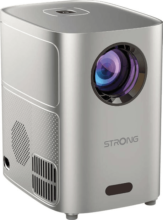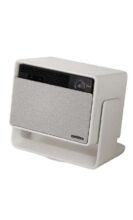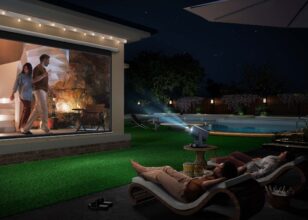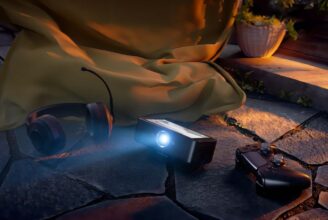Xgimi Aura 2 Review
The Chinese manufacturer XGIMI dominates the market for smart, high-quality mini projectors and uses its experience in the field of laser TVs as well. The new Aura 2 impresses with astonishing innovations.
by Roland Seibt
Contents
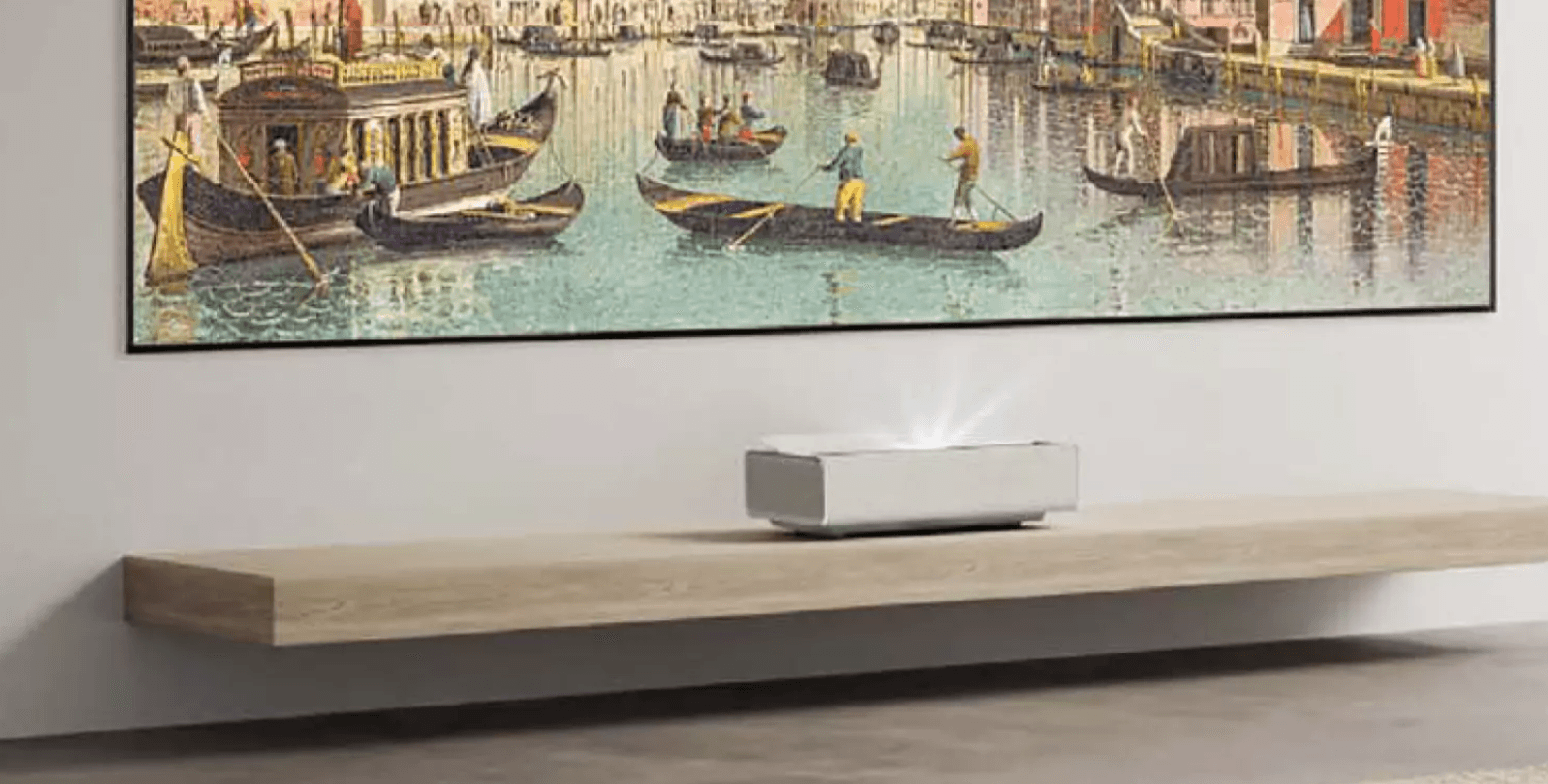
In the living room, a television image should deliver impressive pictures as large as possible, but no gigantic black device should ruin the cozy atmosphere. This is the dilemma faced by all who cannot or do not want to afford a dedicated home theater room. Nowadays, you can get TV sets with 85 or even 100 inches diagonal at real bargain prices, but some can’t even get this splendor into the living room via the elevator for installation. In comparison, laser TVs like our XGIMI Aura 2 deliver even much larger screen diagonals and look extremely stylish in the process.

The smart remote control has a high-quality metal body. It offers voice control and a button for autofocus.
Here, the test device collects its first plus points, as it’s the most compact ultra-short-throw projector in its class and particularly elegantly designed. The Aura 2 impresses with an organically shaped, rounded form at the corners and is covered with “moonlight-sand-colored” fabric, which, according to the manufacturer, is dust-, water-, and oil-repellent. Indeed, we have rarely dealt with audiovisual electronic devices that integrate more harmoniously into the modern living atmosphere than the Aura 2.
Big Cinema, but Not Without Compromises
One thing should always be clear when considering a laser TV: only active displays like OLED or LCD are capable of delivering truly perfect blacks as long as there is residual light in the room. The rule is that in projection, the darkest image content is only as black as the screen is when the projector is turned off. That’s why the home cinema community retreats to blacked-out basements, that’s why cinemas are so dark. And that’s why the simplest and cheapest way to create huge images with a laser TV is not particularly recommended: projecting simply onto a white, smooth wall.
With this design-leading variant, you unfortunately only use a fraction of the possible contrast range. Laser TVs project their images at incredibly steep angles onto the screen, and according to the ancient physical laws of incidence and reflection, most of the light energy lands on the ceiling, even if the screen reflects as matte as possible.
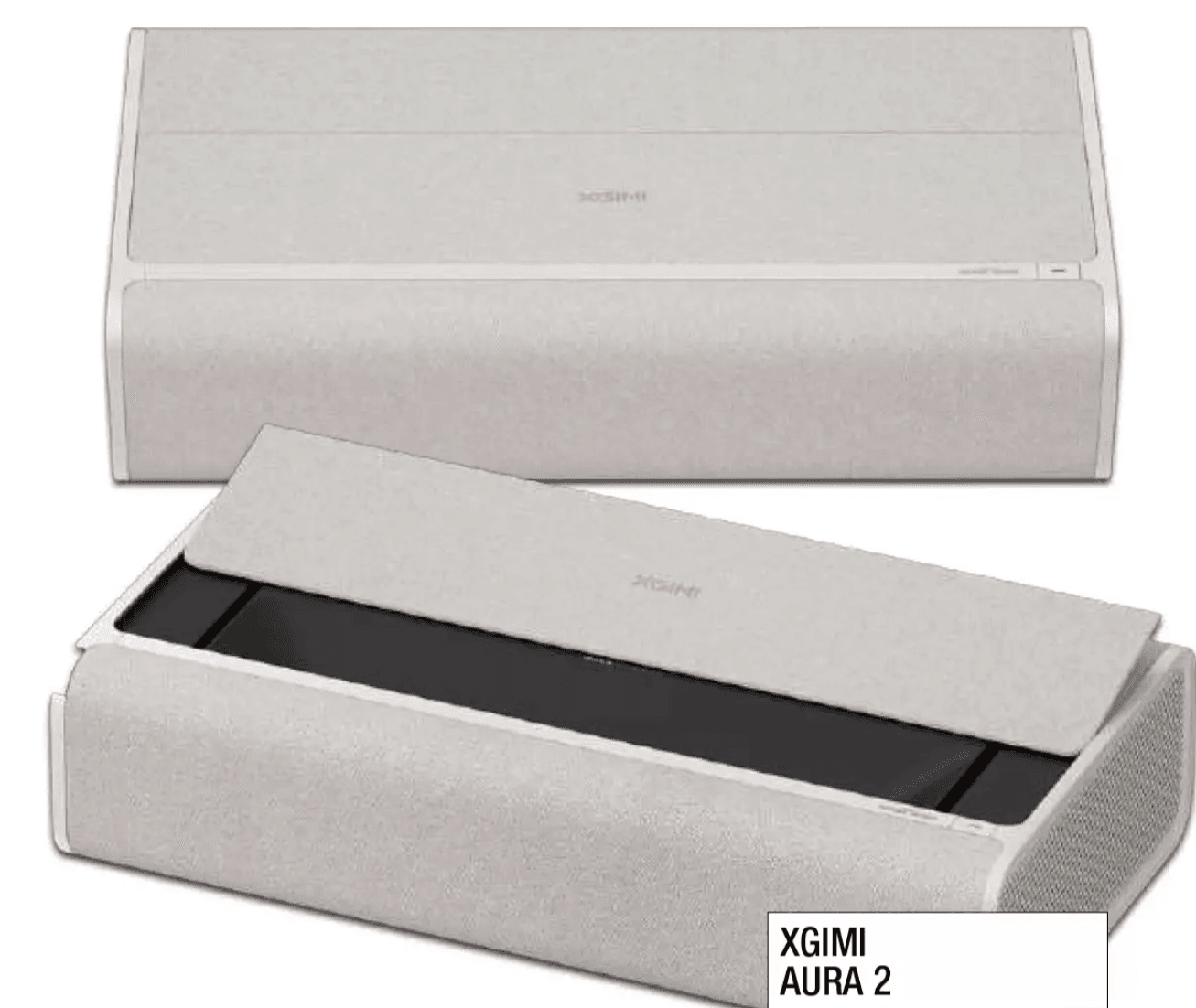
Anyone who values optimal image quality with a laser TV buys a special screen that uses micro-optics to redirect light coming from below towards the viewer. Additionally, ambient light is absorbed, further improving contrast. XGIMI recommends an in-house “100\” Fresnel ALR Screen” for $1500, but we currently cannot find it in the webshop. And of course, then there’s again a 2.5-meter large, gray thing hanging on the living room wall, which is not necessarily desirable. The perfect solution might be a motorized retractable UST screen, as recently presented by XGIMI at the CES trade show.
Design and Technology
We also measure and test the Aura 2 in our reference cinema and image lab, where pitch-black lighting conditions prevail, and classic screens from Stewart are illuminated. In doing so, we determine the ISO lumens in the light path and see that XGIMI remains commendably modest with the advertised value of 2300. In fact, we achieve similar results, even when the image is optimally color-calibrated and averaged over the area as prescribed. The contrast is surprisingly high and is only surpassed by those competitors who let the laser power pump too much in dynamic tests. XGIMI develops its own light engines including optics, and this is the guarantee for that little bit more sharpness and contrast that is extracted from the 0.47-inch DLP micromirror chips. And it allows the Aura to stand a bit closer to the screen than the competition, with a 0.18x throw ratio.
However, the smaller the projection distance, the more critical become keystone distortions and even minimal wall curvatures. Here, XGIMI uses its self-developed technology of particularly fast-setup mini projectors, called ISA 5.0, which now includes correction of wall curvatures in addition to autofocus, auto keystone, wall color correction, and eye protection. We tried it out using our editorial rooms, where drywall walls turned out to be incredibly crooked and uneven. At XGIMI, a QR code calls up a web app on the smartphone, whereupon the photo of a chessboard pattern displayed on the screen is automatically transmitted to the projector and analyzed. Immediately, the image playback is perfectly straight. Whether the Aura has to automatically correct its geometry every time it’s turned on may depend on the installation method, but it is possible in any case. This convenience is a big plus for XGIMI.
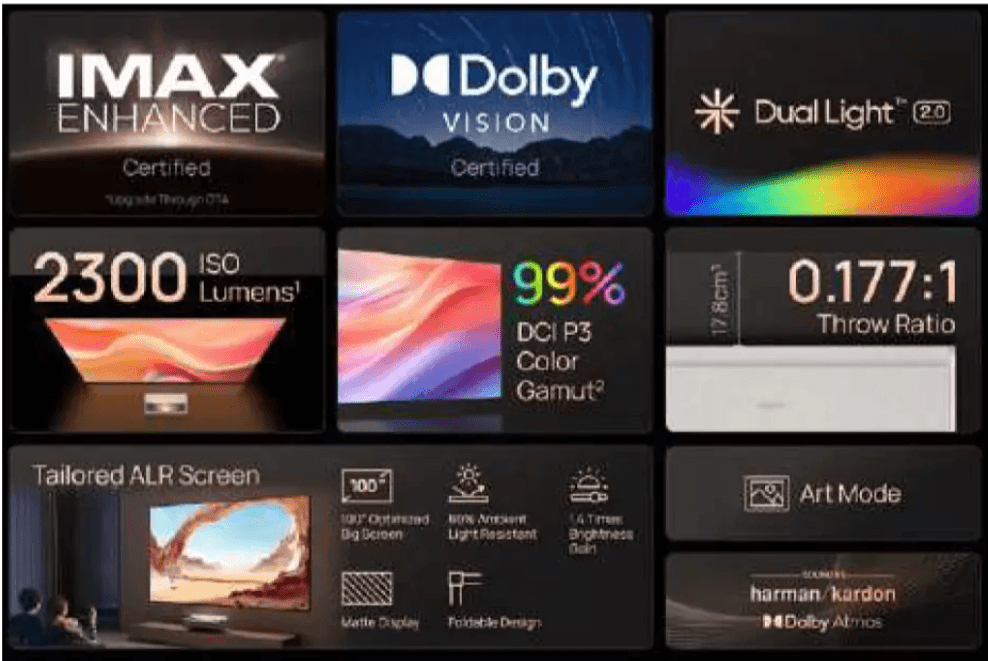
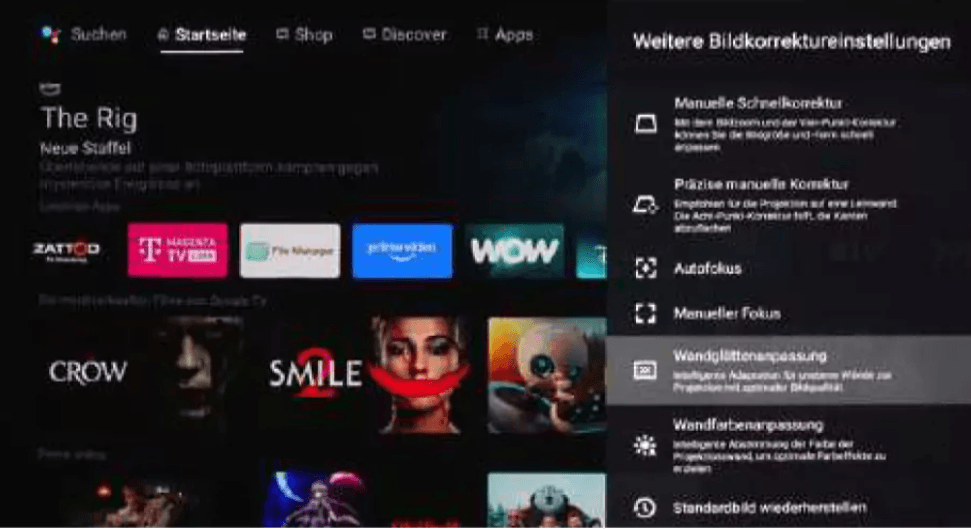
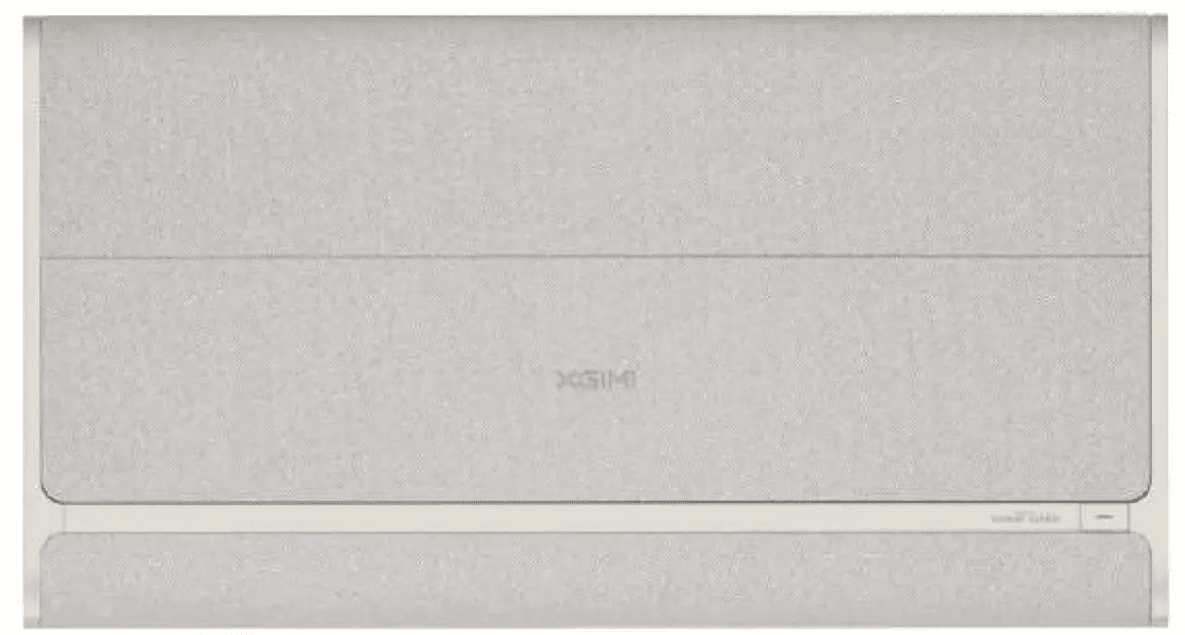
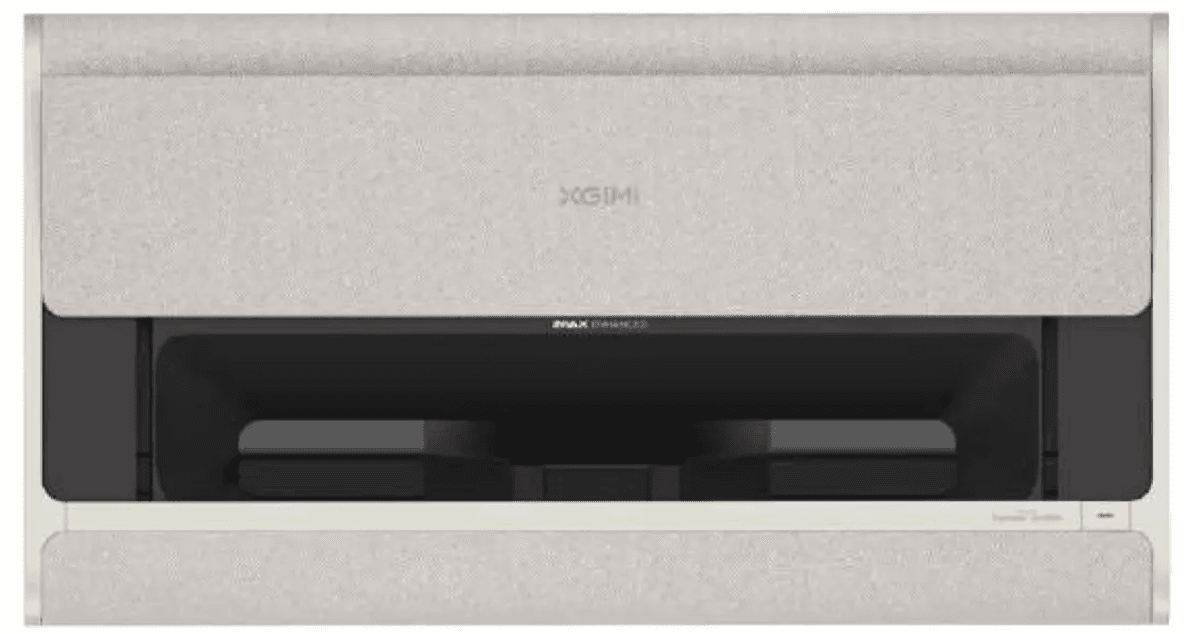

Dual Light Engine
Also in terms of the “lamp”, XGIMI goes its own way. The predecessor was still characterized by blue laser, phosphors, and relatively slow color changes, resulting in limited HDR color space and rainbow artifacts. Now, XGIMI has developed “Dual Light 2.0”, which combines multiple lasers and phosphors, thus extending three narrow-band peaks with broadband green. This combination actually produces significantly more natural-looking colors than many competitors. In our measurements, we found that in some modes an anti-yellow filter came into play, which brought the HDR color space to 84.4% BT.2020 and mastered DCI almost completely—at nearly full light output. Here, unlike its predecessor and many competitors, HDR is now a real treat. To this end, the electronics also process Dolby Vision and IMAX Enhanced, but with the, in our opinion, embarrassing limitation that HDR can hardly be optimized in its image quality.
If an appropriate, even a simple HDR signal arrives, the Aura immediately switches to the IMAX mode, which prevents any adjustment. If you turn off the automatic, you have to activate the HDR color space manually—and deactivate it again each time for HDTV. Of the preset picture modes, only the user mode is calibratable in all aspects—at least—but the professional will complain that, for example, HD images always looked too colorful out of the box. However, if you find the correct playback mode, the color reproduction of the Aura 2 is absolutely excellent. We rate the motion cycles not quite as positively. The XGIMI is fixed at 60 fps, so it uses 3:2 pulldown for 24p movies. Individual film frames are displayed for different lengths on the screen, which causes uneven judder. It looks even worse with European 50 Hz material. Here, the cadence is 2:2:3:2:3.
The slight stuttering is hardly noticeable with normal TV sources at first but becomes disturbing in nice pans. Many competitors can display 50 fps natively, and the discerning viewer will prefer the more uniform playback. For this, you can activate motion compensation on the XGIMI, which, however, even in the “weak” setting liquefies significantly and does not come entirely without halos. On the other hand, rainbow artifacts are comparatively negligible due to the ultra-fast switching lasers (960 per second).
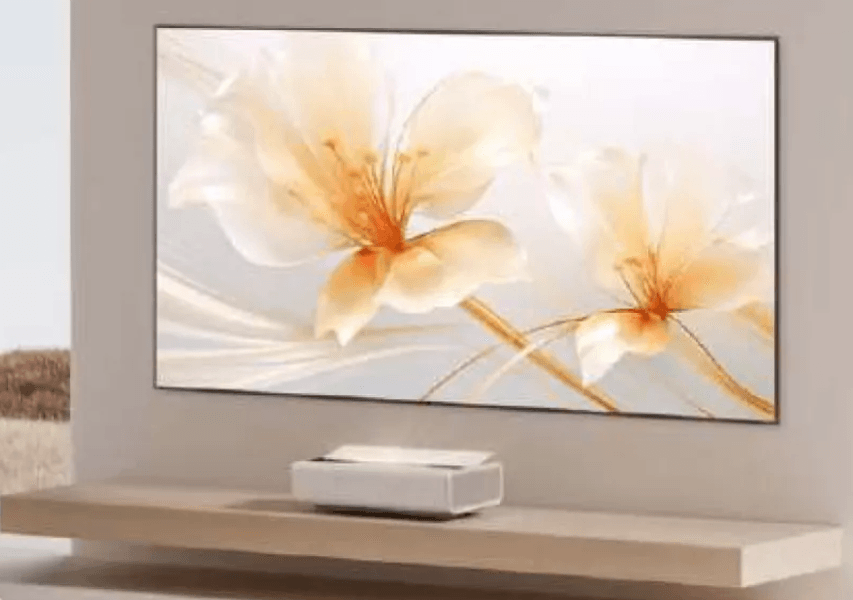
Modern Times
As operating hardware, the Aura 2 is based on the same electronics as the Aura. The quad-core A55 clocks at 1.5 GHz, has 2 GB RAM and a generous 20 GB of free mass storage. Android TV 11 is used—and again all important streaming services and Google extensions work, except unfortunately for Netflix. During installation via smartphone, XGIMI shows informative videos, there’s a raffle, and afterwards, with a music player, a file manager, and the “XGIMI Wall”, a very nicely animated background app, some exclusive bonuses. It must be admitted that the operation of the menus is not particularly responsive, and one might sometimes wish for a source button or “Mute” instead of autofocus on the remote control.
Speaking of Mute:
Surprisingly outstanding was the sound quality of the small projector. Without coloration, a high dynamic range is achieved, with wonderfully natural voices, powerfully pressing, not too deep basses, and clean highs, with decent, albeit only virtual spatiality. Overall, the Aura 2 thus becomes an excellent entertainer.
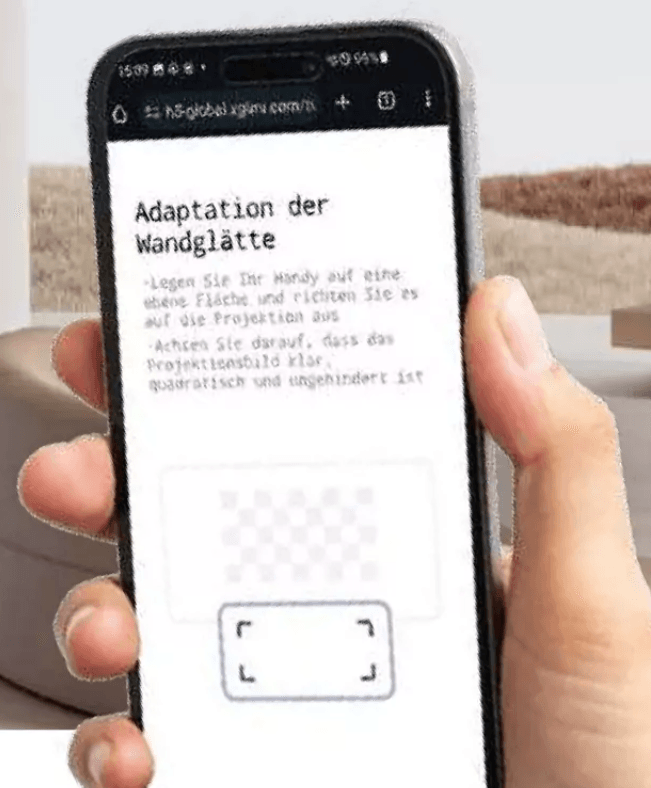
From the Measurement Lab
Image Measurement Ultra HD HDR BT.2100 12 Bit
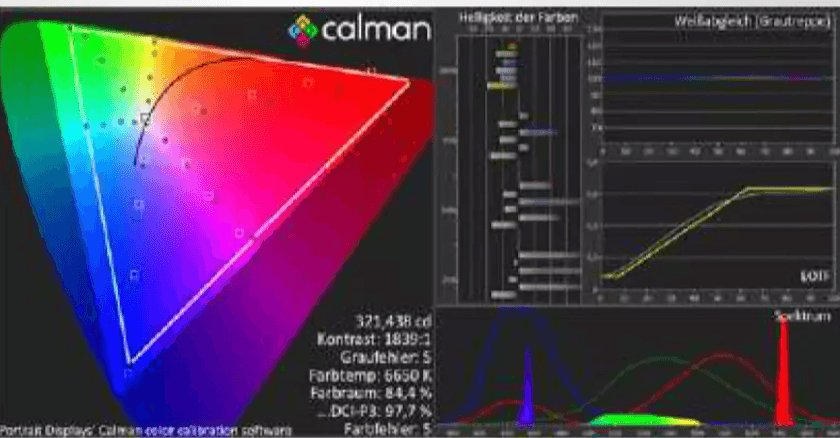
When you limit the HDR signal to DCI as in this measurement, 98% of the volume is covered with cleanly tuned colors. The brilliance is slightly compressed, thus excluding clipping.
Image Measurement HDTV Full HD, BT.709, 8 Bit
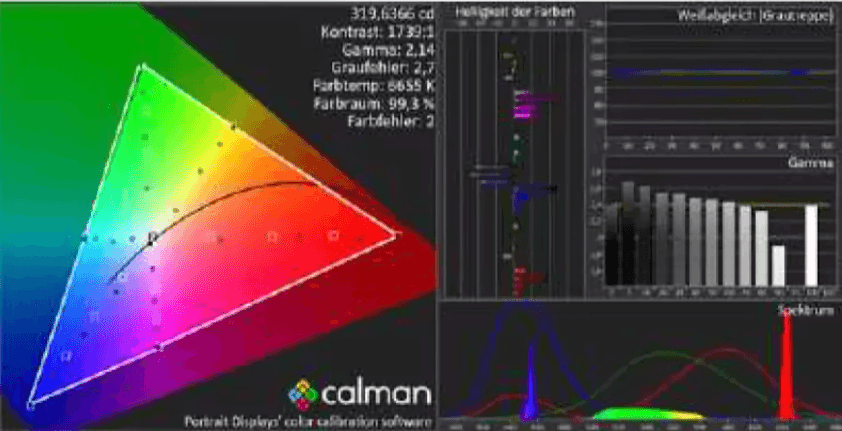
Without HDR, source signals are perfectly reproduced. The slightly increased saturation shown here is advantageous in the projector area without perfect black.
Specs
- Dimensions (W × H × D): 51 × 15 × 27 cm
- Weight: 9 kg
- Resolution / Aspect Ratio: 3840 × 2160 / 16:9
- Color Gamut Coverage HDTV / HDR: 100 % / 84 %
- Contrast ISO / in‐picture / dynamic: 199 / 1100 / 1839
- Black Level / White / White‑Eco: 1.3 / 2492 / 1212 lm
- Gamma / Deviation from Ideal: 2.33 / 2.1 %
- Calibrated Color Temperature / Deviation: 6507 K / 1 %
- Latency Film Mode / Game Mode: 143 ms / 36 ms
- Distance per Meter of Image Width / Zoom: 0.17 m / 1×
- Power Consumption (Film / Eco / Standby): 152 W / 83 W / 0.4 W
Connections
- HDMI / Component / VGA: 3 / – / –
- USB / Network: 3 / 1
- Special Features: Optical audio out, headphone jack, Bluetooth 5.2, WLAN‑ax, eARC
Features
- HDR: DV, HLG, IMAX
- 3D / 3D Glasses Included / 2D to 3D: DLP‑Link / – / –
- Remote Control: Smart
- Motion Compensation: (+)
- HDMI‑CEC (Auto Control): (+)
- Color Saturation / Tint Adjustment: (+ / +)
- Sharpness / Gamma Adjustment: (+ / +)
- Color Temperature Presets: (+)
- RGB Offset / Gain: (+ / +)
- Color Gamut Correction: (+)
- Contrast / Sharpness Automation: (+ / +)
- Adjustable Lamp / Iris: DualLight 2.0 / –
- Lens Shift Horizontal / Vertical / Motorized: (– / – / –)
- Motorized Zoom / Focus: (– / Auto‑focus)
- Presets / Memory Slots: 7 / 1
Verdict
The Aura 2 is a design highlight with the latest HDR image technology. For under $3000, there is no laser TV with better colors.
Overall Score:
– Maximum: 650 points
– Achieved: 497 points
– Rating: “Good”
- Design 4K projector with laser/RGB technology
- Smart TV with Android 11
- HDR with Dolby Vision and IMAX Enhanced
- Rich and powerful sound
- 3D
- No Netflix
- HDR image hardly adjustable
- 4K and 50 Hz not perfectly smooth
Picture Quality
Max 435, Achieved 322 → ~7.4/10 (“Good”)
| Subcategory | Max | Achieved | ≈ /10 |
|---|---|---|---|
| SD / HDTV | 75 | 48 | 6.4 |
| UHD (HDR) | 100 | 71 | 7.1 |
| Contrast | 65 | 57 | 8.8 |
| Sharpness | 45 | 37 | 8.2 |
| Geometry / 3D | 60 | 34 | 5.7 |
| Color Reproduction | 45 | 40 | 8.9 |
| Image Stability | 45 | 35 | 7.8 |
Features (Equipment)
Max 100, Achieved 79 → ~7.9/10 (“Good”)
| Subcategory | Max | Achieved | ≈ /10 |
|---|---|---|---|
| HDMI / Connections | 50 | 43 | 8.6 |
| Projection Optics | 20 | 11 | 5.5 |
| Other Extras | 30 | 25 | 8.3 |
Operation (Ease of Use)
Max 55, Achieved 41 → ~7.5/10 (“Good”)
| Subcategory | Max | Achieved | ≈ /10 |
|---|---|---|---|
| Adjustment Options | 27 | 20 | 7.4 |
| Ergonomics | 8 | 7 | 8.8 |
| Image Control | 6 | 4 | 6.7 |
| Remote Control | 14 | 10 | 7.1 |
Build Quality (Processing)
Max 60, Achieved 55 → ~9.2/10 (“Outstanding”)
| Subcategory | Max | Achieved | ≈ /10 |
|---|---|---|---|
| Appearance | 20 | 19 | 9.5 |
| Materials | 40 | 36 | 9.0 |
Overall Verdict
- 497 / 650 → ~7.6/10 (Good)
When you purchase through links on our site, I may earn an affiliate commission. Here’s how it works.
XGIMI Aura 2 Review - Amazing 4k IMAX Enhanced Projector!
XGIMI Aura 2 Review. 2300 ISO lumen bright 4k HDR, Dolby Vision and IMAX enhanced UST projector. More info: ...







